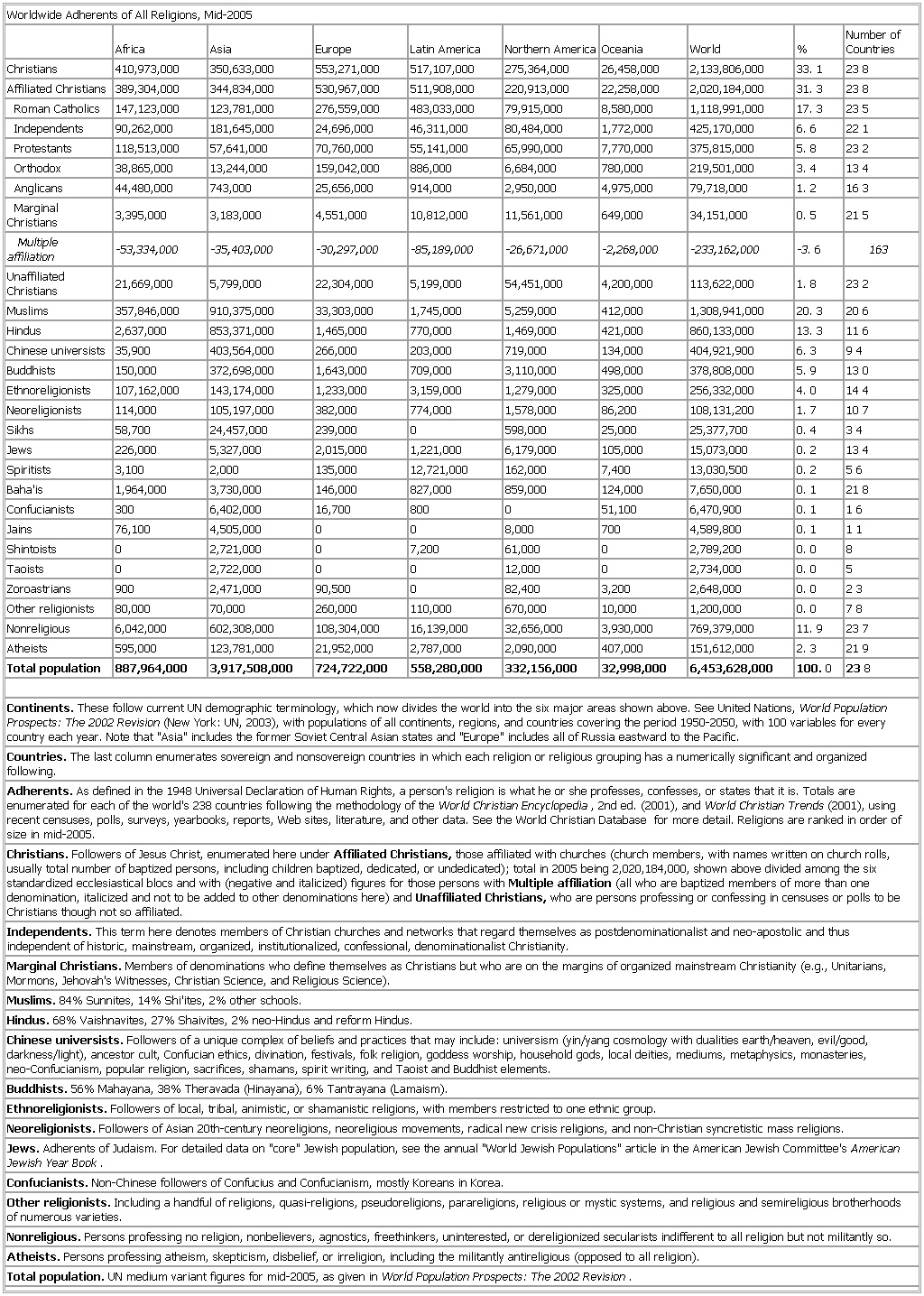- Worldwide Adherents of All Religions, Mid-2005
-
▪ TableWorldwide Adherents of All Religions, Mid-2005Africa Asia Europe Latin America Northern America Oceania World % Number of CountriesChristians 410,973,000 350,633,000 553,271,000 517,107,000 275,364,000 26,458,000 2,133,806,000 33.1 238Affiliated Christians 389,304,000 344,834,000 530,967,000 511,908,000 220,913,000 22,258,000 2,020,184,000 31.3 238Roman Catholics 147,123,000 123,781,000 276,559,000 483,033,000 79,915,000 8,580,000 1,118,991,000 17.3 235Independents 90,262,000 181,645,000 24,696,000 46,311,000 80,484,000 1,772,000 425,170,000 6.6 221Protestants 118,513,000 57,641,000 70,760,000 55,141,000 65,990,000 7,770,000 375,815,000 5.8 232Orthodox 38,865,000 13,244,000 159,042,000 886,000 6,684,000 780,000 219,501,000 3.4 134Anglicans 44,480,000 743,000 25,656,000 914,000 2,950,000 4,975,000 79,718,000 1.2 163Marginal Christians 3,395,000 3,183,000 4,551,000 10,812,000 11,561,000 649,000 34,151,000 0.5 215Multiple affiliation -53,334,000 -35,403,000 -30,297,000 -85,189,000 -26,671,000 -2,268,000 -233,162,000 -3.6 163163Unaffiliated Christians 21,669,000 5,799,000 22,304,000 5,199,000 54,451,000 4,200,000 113,622,000 1.8 232Muslims 357,846,000 910,375,000 33,303,000 1,745,000 5,259,000 412,000 1,308,941,000 20.3 206Hindus 2,637,000 853,371,000 1,465,000 770,000 1,469,000 421,000 860,133,000 13.3 116Chinese universists 35,900 403,564,000 266,000 203,000 719,000 134,000 404,921,900 6.3 94Buddhists 150,000 372,698,000 1,643,000 709,000 3,110,000 498,000 378,808,000 5.9 130Ethnoreligionists 107,162,000 143,174,000 1,233,000 3,159,000 1,279,000 325,000 256,332,000 4.0 144Neoreligionists 114,000 105,197,000 382,000 774,000 1,578,000 86,200 108,131,200 1.7 107Sikhs 58,700 24,457,000 239,000 0 598,000 25,000 25,377,700 0.4 34Jews 226,000 5,327,000 2,015,000 1,221,000 6,179,000 105,000 15,073,000 0.2 134Spiritists 3,100 2,000 135,000 12,721,000 162,000 7,400 13,030,500 0.2 56Baha'is 1,964,000 3,730,000 146,000 827,000 859,000 124,000 7,650,000 0.1 218Confucianists 300 6,402,000 16,700 800 0 51,100 6,470,900 0.1 16Jains 76,100 4,505,000 0 0 8,000 700 4,589,800 0.1 11Shintoists 0 2,721,000 0 7,200 61,000 0 2,789,200 0.0 8Taoists 0 2,722,000 0 0 12,000 0 2,734,000 0.0 5Zoroastrians 900 2,471,000 90,500 0 82,400 3,200 2,648,000 0.0 23Other religionists 80,000 70,000 260,000 110,000 670,000 10,000 1,200,000 0.0 78Nonreligious 6,042,000 602,308,000 108,304,000 16,139,000 32,656,000 3,930,000 769,379,000 11.9 237Atheists 595,000 123,781,000 21,952,000 2,787,000 2,090,000 407,000 151,612,000 2.3 219Total population 887,964,000 3,917,508,000 724,722,000 558,280,000 332,156,000 32,998,000 6,453,628,000 100.0 238Continents. These follow current UN demographic terminology, which now divides the world into the six major areas shown above. See United Nations, World Population Prospects: The 2002 Revision (New York: UN, 2003), with populations of all continents, regions, and countries covering the period 1950-2050, with 100 variables for every country each year. Note that "Asia" includes the former Soviet Central Asian states and "Europe" includes all of Russia eastward to the Pacific.Countries. The last column enumerates sovereign and nonsovereign countries in which each religion or religious grouping has a numerically significant and organized following.Adherents. As defined in the 1948 Universal Declaration of Human Rights, a person's religion is what he or she professes, confesses, or states that it is. Totals are enumerated for each of the world's 238 countries following the methodology of the World Christian Encyclopedia, 2nd ed. (2001), and World Christian Trends (2001), using recent censuses, polls, surveys, yearbooks, reports, Web sites, literature, and other data. See the World Christian Database
for more detail. Religions are ranked in order of size in mid-2005. Christians. Followers of Jesus Christ, enumerated here under Affiliated Christians, those affiliated with churches (church members, with names written on church rolls, usually total number of baptized persons, including children baptized, dedicated, or undedicated); total in 2005 being 2,020,184,000, shown above divided among the six standardized ecclesiastical blocs and with (negative and italicized) figures for those persons with Multiple affiliation (all who are baptized members of more than one denomination, italicized and not to be added to other denominations here) and Unaffiliated Christians, who are persons professing or confessing in censuses or polls to be Christians though not so affiliated.Independents. This term here denotes members of Christian churches and networks that regard themselves as postdenominationalist and neo-apostolic and thus independent of historic, mainstream, organized, institutionalized, confessional, denominationalist Christianity.Marginal Christians. Members of denominations who define themselves as Christians but who are on the margins of organized mainstream Christianity (e.g., Unitarians, Mormons, Jehovah's Witnesses, Christian Science, and Religious Science).Muslims. 84% Sunnites, 14% Shi'ites, 2% other schools.Chinese universists. Followers of a unique complex of beliefs and practices that may include: universism (yin/yang cosmology with dualities earth/heaven, evil/good, darkness/light), ancestor cult, Confucian ethics, divination, festivals, folk religion, goddess worship, household gods, local deities, mediums, metaphysics, monasteries, neo-Confucianism, popular religion, sacrifices, shamans, spirit writing, and Taoist and Buddhist elements.Ethnoreligionists. Followers of local, tribal, animistic, or shamanistic religions, with members restricted to one ethnic group.Neoreligionists. Followers of Asian 20th-century neoreligions, neoreligious movements, radical new crisis religions, and non-Christian syncretistic mass religions.Jews. Adherents of Judaism. For detailed data on "core" Jewish population, see the annual "World Jewish Populations" article in the American Jewish Committee's American Jewish Year Book.Confucianists. Non-Chinese followers of Confucius and Confucianism, mostly Koreans in Korea.Other religionists. Including a handful of religions, quasi-religions, pseudoreligions, parareligions, religious or mystic systems, and religious and semireligious brotherhoods of numerous varieties.Nonreligious. Persons professing no religion, nonbelievers, agnostics, freethinkers, uninterested, or dereligionized secularists indifferent to all religion but not militantly so.Atheists. Persons professing atheism, skepticism, disbelief, or irreligion, including the militantly antireligious (opposed to all religion).Total population. UN medium variant figures for mid-2005, as given in World Population Prospects: The 2002 Revision.See as table:
* * *
Universalium. 2010.
